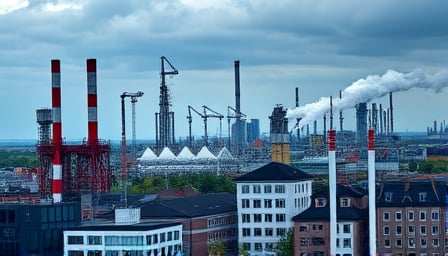Jungheinrich AG Financial Update
Jungheinrich AG, a prominent German company based in Hamburg, has been navigating a challenging financial landscape in 2025. Operating within the Industrials sector, the company specializes in manufacturing battery, diesel, and gas-powered stackers and forklifts, alongside offering services such as shelving systems, forklift rentals, and fleet management. Despite its diversified operations across Europe, the Americas, Africa, and Asia, recent financial news highlights several concerns and developments.
Stock Performance and Investment Returns
As of August 13, 2025, Jungheinrich’s stock was trading at 33.1 EUR on Xetra, down from a 52-week high of 42.84 EUR on July 8, 2025. Investors who purchased shares a year ago at 27.82 EUR would have seen their investment grow to 1,189.79 EUR, reflecting a positive return despite the stock’s recent volatility. This performance underscores the resilience of Jungheinrich’s stock amidst broader market fluctuations.
Analyst Downgrades and Outlook Concerns
Berenberg, a notable financial services firm, recently lowered its stock price target for Jungheinrich to 46 EUR, citing concerns over the company’s outlook. This adjustment reflects growing apprehensions about the company’s future performance, particularly in light of its recent strategic decisions.
Strategic Challenges and Cost-Cutting Measures
Jungheinrich has announced a significant reduction in its annual targets, coupled with the initiation of a comprehensive transformation program. This program is expected to have an immediate negative impact on the company’s financial results, including the planned reduction or outsourcing of approximately 1,000 positions globally. These measures come in response to a weaker-than-expected business performance and the financial implications of a new cost-cutting initiative, as well as the planned divestiture of its Russian operations.
Market Competition and Profit Margins
The company is also facing intense price competition, which has necessitated a stringent cost-cutting strategy to maintain profitability. This competitive pressure is part of a broader industry trend that is impacting profit margins across the sector.
Conclusion
Jungheinrich AG is at a critical juncture, with its leadership implementing strategic changes aimed at navigating the current economic challenges. While the company has demonstrated resilience in the past, the effectiveness of its transformation program and cost-cutting measures will be crucial in determining its future trajectory. Investors and stakeholders will be closely monitoring Jungheinrich’s performance in the coming months to assess the impact of these strategic decisions on its financial health and market position.
